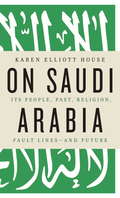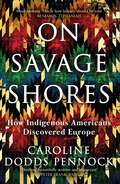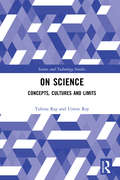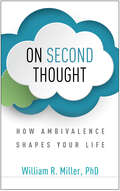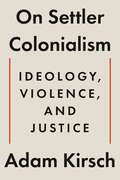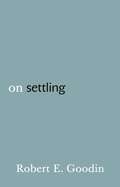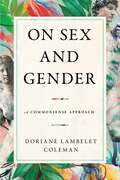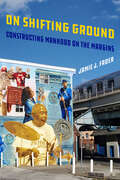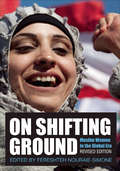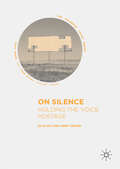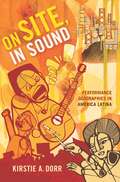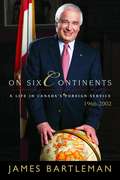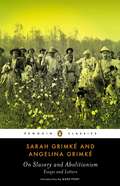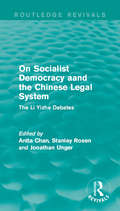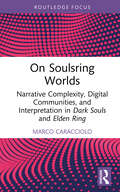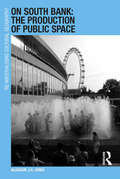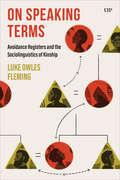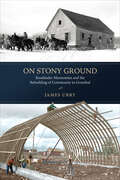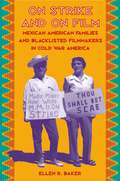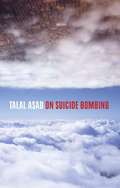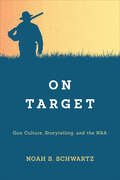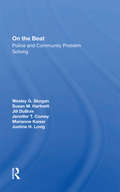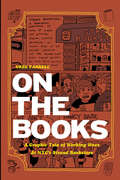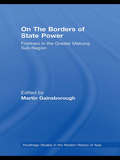- Table View
- List View
On Saudi Arabia: Its People, Past, Religion, Fault Lines - and Future
by Karen Elliott HouseFrom the Pulitzer Prize-winning reporter who has spent the last thirty years writing about Saudi Arabia--as diplomatic correspondent, foreign editor, and then publisher of The Wall Street Journal--an important and timely book that explores all facets of life in this shrouded Kingdom: its tribal past, its complicated present, its precarious future. Through observation, anecdote, extensive interviews, and analysis Karen Elliot House navigates the maze in which Saudi citizens find themselves trapped and reveals the mysterious nation that is the world's largest exporter of oil, critical to global stability, and a source of Islamic terrorists. In her probing and sharp-eyed portrait, we see Saudi Arabia, one of the last absolute monarchies in the world, considered to be the final bulwark against revolution in the region, as threatened by multiple fissures and forces, its levers of power controlled by a handful of elderly Al Saud princes with an average age of 77 years and an extended family of some 7,000 princes. Yet at least 60 percent of the increasingly restive population they rule is under the age of 20. The author writes that oil-rich Saudi Arabia has become a rundown welfare state. The public pays no taxes; gets free education and health care; and receives subsidized water, electricity, and energy (a gallon of gasoline is cheaper in the Kingdom than a bottle of water), with its petrodollars buying less and less loyalty. House makes clear that the royal family also uses Islam's requirement of obedience to Allah--and by extension to earthly rulers--to perpetuate Al Saud rule. Behind the Saudi facade of order and obedience, today's Saudi youth, frustrated by social conformity, are reaching out to one another and to a wider world beyond their cloistered country. Some 50 percent of Saudi youth is on the Internet; 5.1 million Saudis are on Facebook. To write this book, the author interviewed most of the key members of the very private royal family. She writes about King Abdullah's modest efforts to relax some of the kingdom's most oppressive social restrictions; women are now allowed to acquire photo ID cards, finally giving them an identity independent from their male guardians, and are newly able to register their own businesses but are still forbidden to drive and are barred from most jobs. With extraordinary access to Saudis--from key religious leaders and dissident imams to women at university and impoverished widows, from government officials and political dissidents to young successful Saudis and those who chose the path of terrorism--House argues that most Saudis do not want democracy but seek change nevertheless; they want a government that provides basic services without subjecting citizens to the indignity of begging princes for handouts; a government less corrupt and more transparent in how it spends hundreds of billions of annual oil revenue; a kingdom ruled by law, not royal whim. In House's assessment of Saudi Arabia's future, she compares the country today to the Soviet Union before Mikhail Gorbachev arrived with reform policies that proved too little too late after decades of stagnation under one aged and infirm Soviet leader after another. She discusses what the next generation of royal princes might bring and the choices the kingdom faces: continued economic and social stultification with growing risk of instability, or an opening of society to individual initiative and enterprise with the risk that this, too, undermines the Al Saud hold on power. A riveting book--informed, authoritative, illuminating--about a country that could well be on the brink, and an in-depth examination of what all this portends for Saudi Arabia's future, and for our own.From the Hardcover edition.
On Savage Shores: How Indigenous Americans Discovered Europe
by Caroline Dodds PennockWe have long been taught to presume that modern global history began when the 'Old World' encountered the 'New', when Christopher Columbus 'discovered' America in 1492. But, as Caroline Dodds Pennock conclusively shows in this groundbreaking book, for tens of thousands of Aztecs, Maya, Totonacs, Inuit and others - enslaved people, diplomats, explorers, servants, traders - the reverse was true: they discovered Europe. For them, Europe comprised savage shores, a land of riches and marvels, yet perplexing for its brutal disparities of wealth and quality of life, and its baffling beliefs. The story of these Indigenous Americans abroad is a story of abduction, loss, cultural appropriation, and, as they saw it, of apocalypse - a story that has largely been absent from our collective imagination of the times. From the Brazilian king who met Henry VIII to the Aztecs who mocked up human sacrifice at the court of Charles V; from the Inuk baby who was put on show in a London pub to the mestizo children of Spaniards who returned 'home' with their fathers; from the Inuit who harpooned ducks on the Avon river to the many servants employed by Europeans of every rank: here are a people who were rendered exotic, demeaned, and marginalised, but whose worldviews and cultures had a profound impact on European civilisation. Drawing on their surviving literature and poetry and subtly layering European eyewitness accounts against the grain, Pennock gives us a sweeping account of the Indigenous American presence in, and impact on, early modern Europe.
On Science: Concepts, Cultures and Limits (Science and Technology Studies)
by Urmie Ray Tuhina RayOn Science: Concepts, Cultures, and Limits explores science and its relationship with religion, philosophy, ethics, mathematics, and with socio-economic changes. The book gives an overview of the metaphysical contexts in which science emerged and the particular forms science has taken in history. It examines the preoccupation of ancient cultures with the validity of interpretations of natural phenomena, the role of the study of materials in the substantiation of the conceptual world, and the establishment of modern science on both experimentation and mathematics. This theoretical discussion is illustrated by a host of examples from physics to the life sciences, which highlight how current concepts developed over the centuries, or even millennia. The volume underscores some of the weaknesses inherent in a scientific approach, and how in the modern context of a wealth-driven technological orientation, these have been conducive to a gradual distortion of science into its exact opposite, a dogmatic faith. It further discusses the nature of scientific education in the world, and how conditions can be created to ensure pioneering creativity and to preserve scientific rigor. The book will be of great interest to scholars, teachers and researchers of science, the metaphysics and philosophy of science, mathematics, science and technology studies, epistemology, ethics, history and sociology. It will also be useful for general readers who are interested in the history of scientific discoveries and ideas as well as in the issues surrounding science today, in particular its relations with many urgent problems.
On Second Thought: How Ambivalence Shapes Your Life
by William R. MillerThe rich inner world of a human being is far more complex than either/or. You can love and hate, want to go and want to stay, feel both joy and sadness. Psychologist William Miller--one of the world's leading experts on the science of change--offers a fresh perspective on ambivalence and its transformative potential in this revealing book. Rather than trying to overcome indecision by force of will, Dr. Miller explores what happens when people allow opposing arguments from their &“inner committee members&” to converse freely with each other. Learning to tolerate and even welcome feelings of ambivalence can help you get unstuck from unwanted habits, clarify your desires and values, explore the pros and cons of tough decisions, and open doorways to change. Vivid examples from everyday life, literature, and history illustrate why we are so often "of two minds," and how to work through it.
On Settler Colonialism: Ideology, Violence, and Justice
by Adam KirschA prominent public intellectual tackles one of the most crucial political ideas of our moment. Since Hamas’s attack on Israel last October 7, the term “settler colonialism” has become central to public debate in the United States. A concept new to most Americans, but already established and influential in academic circles, settler colonialism is shaping the way many people think about the history of the United States, Israel and Palestine, and a host of political issues. This short book is the first to examine settler colonialism critically for a general readership. By critiquing the most important writers, texts, and ideas in the field, Adam Kirsch shows how the concept emerged in the context of North American and Australian history and how it is being applied to Israel. He examines the sources of its appeal, which, he argues, are spiritual as much as political; how it works to delegitimize nations; and why it has the potential to turn indignation at past injustices into a source of new injustices today. A compact and accessible introduction, rich with historical detail, the book will speak to readers interested in the Middle East, American history, and today’s most urgent cultural-political debates.
On Settling
by Robert E. GoodinThe hidden value of settlingIn a culture that worships ceaseless striving, "settling" seems like giving up. But is it? On Settling defends the positive value of settling, explaining why this disdained practice is not only more realistic but more useful than an excessive ideal of striving. In fact, the book makes the case that we'd all be lost without settling—and that even to strive, one must first settle.We may admire strivers and love the ideal of striving, but who of us could get through a day without settling? Real people, confronted with a complex problem, simply make do, settling for some resolution that, while almost certainly not the best that one could find by devoting limitless time and attention to the problem, is nonetheless good enough. Robert Goodin explores the dynamics of this process. These involve taking as fixed, for now, things that we reserve the right to reopen later (nothing is fixed for good, although events might always overtake us). We settle on some things in order to concentrate better on others. At the same time we realize we may need to come back later and reconsider those decisions. From settling on and settling for, to settling down and settling in, On Settling explains why settling is useful for planning, creating trust, and strengthening the social fabric—and why settling is different from compromise and resignation.So, the next time you're faced with a thorny problem, just settle. It's no failure.
On Sex and Gender: A Commonsense Approach
by Doriane Lambelet ColemanAn eye-opening account of what the left and right get wrong about sex and gender—and how we can be a thoughtful, sex-smart society.On Sex and Gender focuses on three sequential and consequential questions: What is sex as opposed to gender? How does sex matter in our everyday lives? And how should it be reflected in law and policy? All three have been front-and-center in American life and politics since the rise of the trans rights movement: They are included in both major parties&’ political platforms. They are the subject of ongoing litigation in the federal courts and of highly contentious legislation on Capitol Hill. And they are a pivotal issue in the culture wars between left and right playing out around dinner tables, on campuses and school boards, on op-ed pages, and in corporate handbooks. Doriane Coleman challenges both sides to chart a better way. In a book that is equal parts scientific explanation, historical examination, and personal reflection, she argues that denying biological sex and focusing only on gender would have detrimental effects on women&’s equal opportunity, on men&’s future prospects, and on the health and welfare of society. Structural sexism needed to be dismantled—a true achievement of feminism and an ongoing fight—but going forward we should be sex smart, not sex blind. This book is a clear guide for reasonable Americans on sex and gender—something everyone wants to understand but is terrified to discuss. Coleman shows that the science is settled, but equally that there is a middle ground where common sense reigns and we can support transgender people without denying the facts of human biology. She livens her narrative with a sequence of portraits of exceptional human beings from legal pioneers like Myra Bradwell and Ketanji Brown Jackson to champion athletes like Caster Semenya and Cate Campbell to civil rights giants like Ruth Bader Ginsburg and Pauli Murray. Above all, Coleman reminds us that sex not only exists, but is also good—and she shows how we can get both sex and gender right for society.
On Shifting Ground: Constructing Manhood on the Margins (Gender and Justice #11)
by Jamie FaderOn Shifting Ground examines how it is to become a man in a place and time defined by economic contraction and carceral expansion. Jamie J. Fader draws on in-depth interviews with a racially diverse sample of Philadelphia's millennial men to analyze the key tensions that organize their lives: isolation versus connectedness, stability versus "drama," hope versus fear, and stigma and shame versus positive, masculine affirmation. In the unfamiliar cultural landscape of contemporary adult masculinity, these men strive to define themselves in terms of what they can accomplish despite negative labels, as well as seeking to avoid "becoming a statistic" in the face of endemic risk.
On Shifting Ground: Muslim Women in the Global Era
by Edited by Fereshteh Nouraie-Simone&“Thoughtful, highly relevant, and frequently brilliant essays on the contemporary ideas, organization, activities, and agency of Muslim women&” (Nikki Keddie, author of Women in the Middle East: Past and Present). The world has drastically changed in recent years due to armed conflict, economic issues, and cultural revolutions both positive and negative. Nowhere have those changes been felt more than in the Middle East and Muslim worlds. And no one within those worlds has been more affected than women, who face new and vital questions. Has Arab Spring made life better for Muslim women? Has new media empowered feminists or is it simply a tool of the opposition? Will the newfound freedoms of Middle Eastern women grow or be taken away by yet more oppressive regimes? This &“provocative volume&” has been updated with a new introduction and two new essays, offering insider views on how Muslim women are navigating technology, social media, public space, the tension between secularism and fundamentalism, and the benefits and responsibilities of citizenship (Nikki Keddie, Professor Emerita of Middle Eastern and Iranian History, UCLA).
On Silence: Holding the Voice Hostage (The Palgrave Lacan Series)
by Ed Pluth Cindy ZeiherThis book promotes a Lacanian approach to silence, arguing that Lacanian psychoanalysis is distinctive for putting a high value on both silence and language. Unlike other disciplines and discourses the authors do not treat silence as a mystical-impossible beyond, at the cost of demoting the value of language and thought. Rather than treating silence with awe and wonder, this book puts silence to work, and it does so in order to deal with the inevitable alienation that comes with becoming speaking-beings. This illuminating book will be of great interest to scholars of Lacan and the psychosocial, as well as more broadly to philosophers and linguists alike.
On Site, In Sound: Performance Geographies in América Latina
by Kirstie A. DorrIn On Site, In Sound Kirstie A. Dorr examines the spatiality of sound and the ways in which the sonic is bound up in perceptions and constructions of geographic space. Focusing on the hemispheric circulation of South American musical cultures, Dorr shows how sonic production and spatial formation are mutually constitutive, thereby pointing to how people can use music and sound to challenge and transform dominant conceptions and configurations of place. Whether tracing how the evolution of the Peruvian folk song "El Condor Pasa" redefined the boundaries between national/international and rural/urban, or how a pan-Latin American performance center in San Francisco provided a venue through which to challenge gentrification, Dorr highlights how South American musicians and activists created new and alternative networks of cultural exchange and geopolitical belonging throughout the hemisphere. In linking geography with musical sound, Dorr demonstrates that place is more than the location where sound is produced and circulated; it is a constructed and contested domain through which social actors exert political influence.
On Six Continents: A Life In Canada's Foreign Service, 1966-2002
by James K. BartlemanMuskoka, the University of Western Ontario, Ottawa, New York, Colombia, Bangladesh, Nicaragua, Peru, Cuba, Israel, Belgium, South Africa, Australia -the place-names tell the story of an amazing career. Then there are the people involved -Trudeau, Clark, and Chrétien, Kissinger, Castro, Rabin, Walesa, Havel, Mandela and dozens of others. Not to mention the moments of high drama: when young Jim Bartleman becomes Ottawa's security expert on terrorism during the FLQ crisis in 1970; or when he leads the movement to bring countries like Poland and Ukraine into NATO and the West.But this is also a light-hearted look at what our diplomats actually do and is full of funny stories: so watch young Jim attend a drunken party with Trudeau; compete with Mother Teresa for Bangladesh babies; or sweep his Belgian bride off her feet to the altar. Bartleman also writes candidly about falling prey to depression, and about his concern, as a native Canadian, to see aboriginal peoples well treated. In summary, a richly varied career, as the only Canadian diplomat to serve on all six continents, well told by a remarkable character.***On Six Continents is a Douglas Gibson Book.From the Hardcover edition.
On Slavery and Abolitionism
by Mark Perry Angelina Grimke Sarah GrimkeA collection of historic writings from the slave-owner-turned-abolitionist sisters portrayed in Sue Monk Kidd's novel The Invention of WingsSarah and Angelina Grimké's portrayal in Sue Monk Kidd's latest novel, The Invention of Wings, has brought much-deserved new attention to these inspiring Americans. The first female agents for the American Anti-Slavery Society, the sisters originally rose to prominence after Angelina wrote a rousing letter of support to renowned abolitionist William Garrison in the wake of Philadelphia's pro-slavery riots in 1935. Born into Southern aristocracy, the Grimkés grew up in a slave-holding family. Hetty, a young house servant, whom Sarah secretly taught to read, deeply influenced Sarah Grimké's life, sparking her commitment to anti-slavery activism. As adults, the sisters embraced Quakerism and dedicated their lives to the abolitionist and women's rights movements. Their appeals and epistles were some of the most eloquent and emotional arguments against slavery made by any abolitionists. Their words, greeted with trepidation and threats in their own time, speak to us now as enduring examples of triumph and hope.For more than sixty-five years, Penguin has been the leading publisher of classic literature in the English-speaking world. With more than 1,500 titles, Penguin Classics represents a global bookshelf of the best works throughout history and across genres and disciplines. Readers trust the series to provide authoritative texts enhanced by introductions and notes by distinguished scholars and contemporary authors, as well as up-to-date translations by award-winning translators.From the Trade Paperback edition.
On Socialist Democracy and the Chinese Legal System: The Li Yizhe Debates (Routledge Revivals)
by Anita Chan, Stanley Rosen and Jonathan UngerIn 1974, a small group of young intellectuals, the Li Yizhe group, circulated their dissident manifesto, ‘On Socialist Democracy and the Legal System,’ a probing critique of the leftist authoritarianism of Mao Zedong. This title examines the writings of these dissidents as a means to better understand the views of non-Party Marxists in their struggle to defy the government and construct their own vision of a socialist China. Originally published in 1985, this title remains relevant in relation to contemporary Chinese politics and will be of interest to students of Asian Studies and Politics.
On Soulsring Worlds: Narrative Complexity, Digital Communities, and Interpretation in Dark Souls and Elden Ring (ISSN)
by Marco CaraccioloThe first book-length study devoted to FromSoftware games, On Soulsring Worlds explores how the Dark Souls series and Elden Ring are able to reconcile extreme difficulty in both gameplay and narrative with broad appeal.Arguing that the games are strategically positioned in relation to contemporary audiences and designed to tap into the new forms of interpretation afforded by digital media, the author situates the games vis-à-vis a number of current debates, including the posthuman and the ethics of gameplay. The book delivers an object lesson on the value of narrative (and) complexity in digital play and in the interpretive practices it gives rise to.Cross-fertilizing narrative theory, game studies, and nonhuman-oriented philosophy, this book will appeal to students and scholars of game studies, media studies, narratology, and video game ethnography.
On South Bank: The Production Of Public Space
by Alasdair J.H. JonesTensions over the production of urban public space came to the fore in summer 2013 with mass protests in Turkey sparked by a plan to redevelop Taksim Gezi Park, Istanbul. In London, concomitant proposals to refurbish an area of the ’South Bank’ historically used by skateboarders were similarly met by staunch opposition. Through an in-depth ethnographic examination of London’s South Bank, this book explores multiple dimensions of the production of urban public space. Drawing on user accounts of the significance of public space, as well as observations of how the South Bank is ’practised’ on a daily basis, it argues that public space is valued not only for its essential material characteristics but also for the productive potential that these characteristics, if properly managed, afford on a daily basis. At a time when policy-makers, urban planners and law enforcement authorities simultaneously grapple with pressures to deal with social 'problems' (such as street drinking, vandalism, and skateboarding) and accusations that new modes of urban planning and civic management infringe upon civil liberties and dilute the publicity of ’public’ space, this book offers an insightful account of the daily exigencies of public spaces. In so doing, it questions the utility of the public/private binary for our understanding both of common urban space and of different sets of social practices, and points towards the need to be attentive to productive processes in how we understand and experience urban open space as public.
On Speaking Terms: Avoidance Registers and the Sociolinguistics of Kinship (Studies in the Anthropology of Language, Sign, and Social Life)
by Luke FlemingWhy are kin, in societies all over the world, divided into “joking” and “avoidance” relations? Foundational figures in the human sciences, from E.B. Tylor and Alfred Radcliffe-Brown to Sigmund Freud and Claude Lévi-Strauss, have sought to explain why some classes of kin are normatively expected to prank and tease one another while others must studiously avoid each other’s presence. In this extensively researched comparative study, linguistic anthropologist Luke Owles Fleming offers a bold new answer to this problem. With a particular focus on avoidance relationships, On Speaking Terms argues that in order to understand cross-cultural convergences in the patterning of kinship-keyed comportments, we must attend to the sociolinguistic codes through which kinship relationships are enacted. Drawing on ethnographic data from more than one hundred different societies, the book documents and analyses parallels in the linguistic and non-verbal signs through which avoidance relationships are experientially realized. With dedicated discussions of Aboriginal Australian “mother-in-law languages,” name and word tabooing practices, pronominal honorification, and non-verbal strategies of interactional and sensorial avoidance, it reveals recurrent sociolinguistic patterns attested in kinship avoidance. In demonstrating the vital role of sociolinguistic codes for transforming kinship categories into phenomenologically rich relationships, On Speaking Terms makes an important contribution to the anthropology of kinship.
On Stony Ground: Russländer Mennonites and the Rebuilding of Community in Grunthal (Transnational Mennonite Studies #2)
by James UrryOn Stony Ground presents a historical ethnographic account of a generation of Mennonites from the Soviet Union who, following Russia’s revolution and civil war, immigrated to Manitoba during the 1920s. James Urry examines how they came to terms with a new land and with their new neighbours, including other Mennonites, Ukrainians, French Canadians, and Indigenous Peoples. The book discusses the impact of the Great Depression and how the immigrants struggled with their identity in Canada as Hitler and Stalin rose to power in Germany and the USSR. It reveals the immigrants’ desire to maintain their faith, language, and culture while encouraging their children to take advantage of an education conducted mainly in English. On Stony Ground explores how prosperity following the Second World War helped the immigrants to build a community in conjunction with others, including Mennonites and non-Mennonites, and to accept their new home in Canada.
On Strike and on Film
by Ellen R. BakerIn 1950, Mexican American miners went on strike for fair working conditions in Hanover, New Mexico. When an injunction prohibited miners from picketing, their wives took over the picket lines--an unprecedented act that disrupted mining families but ultimately ensured the strikers' victory in 1952. In On Strike and on Film, Ellen Baker examines the building of a leftist union that linked class justice to ethnic equality. She shows how women's participation in union activities paved the way for their taking over the picket lines and thereby forcing their husbands, and the union, to face troubling questions about gender equality.Baker also explores the collaboration between mining families and blacklisted Hollywood filmmakers that resulted in the controversial 1954 film Salt of the Earth. She shows how this worker-artist alliance gave the mining families a unique chance to clarify the meanings of the strike in their own lives and allowed the filmmakers to create a progressive alternative to Hollywood productions. An inspiring story of working-class solidarity, Mexican American dignity, and women's liberation, Salt of the Earth was itself blacklisted by powerful anticommunists, yet the movie has endured as a vital contribution to American cinema.
On Suicide Bombing (The Wellek Library Lectures)
by Talal AsadLike many people in America and around the world, Talal Asad experienced the events of September 11, 2001, largely through the media and the emotional response of others. For many non-Muslims, "the suicide bomber" quickly became the icon of "an Islamic culture of death"-a conceptual leap that struck Asad as problematic. Is there a "religiously-motivated terrorism?" If so, how does it differ from other cruelties? What makes its motivation "religious"? Where does it stand in relation to other forms of collective violence? Drawing on his extensive scholarship in the study of secular and religious traditions as well as his understanding of social, political, and anthropological theory and research, Asad questions Western assumptions regarding death and killing. He scrutinizes the idea of a "clash of civilizations," the claim that "Islamic jihadism" is the essence of modern terror, and the arguments put forward by liberals to justify war in our time. He critically engages with a range of explanations of suicide terrorism, exploring many writers' preoccupation with the motives of perpetrators. In conclusion, Asad examines our emotional response to suicide (including suicide terrorism) and the horror it invokes. On Suicide Bombing is an original and provocative analysis critiquing the work of intellectuals from both the left and the right. Though fighting evil is an old concept, it has found new and disturbing expressions in our contemporary "war on terror. " For Asad, it is critical that we remain aware of the forces shaping the discourse surrounding this mode of violence, and by questioning our assumptions about morally good and morally evil ways of killing, he illuminates the fragile contradictions that are a part of our modern subjectivity.
On Suicide Bombing (The Wellek Library Lectures)
by Talal AsadLike many people in America and around the world, Talal Asad experienced the events of September 11, 2001, largely through the media and the emotional response of others. For many non-Muslims, "the suicide bomber" quickly became the icon of "an Islamic culture of death"-a conceptual leap that struck Asad as problematic. Is there a "religiously-motivated terrorism?" If so, how does it differ from other cruelties? What makes its motivation "religious"? Where does it stand in relation to other forms of collective violence?Drawing on his extensive scholarship in the study of secular and religious traditions as well as his understanding of social, political, and anthropological theory and research, Asad questions Western assumptions regarding death and killing. He scrutinizes the idea of a "clash of civilizations," the claim that "Islamic jihadism" is the essence of modern terror, and the arguments put forward by liberals to justify war in our time. He critically engages with a range of explanations of suicide terrorism, exploring many writers' preoccupation with the motives of perpetrators. In conclusion, Asad examines our emotional response to suicide (including suicide terrorism) and the horror it invokes.On Suicide Bombing is an original and provocative analysis critiquing the work of intellectuals from both the left and the right. Though fighting evil is an old concept, it has found new and disturbing expressions in our contemporary "war on terror." For Asad, it is critical that we remain aware of the forces shaping the discourse surrounding this mode of violence, and by questioning our assumptions about morally good and morally evil ways of killing, he illuminates the fragile contradictions that are a part of our modern subjectivity.
On Target: Gun Culture, Storytelling, and the NRA
by Noah S. SchwartzThe National Rifle Association (NRA) is an important actor in the American gun debate. While popular explanations for the group’s influence often focus on the NRA’s lobbying and campaign donations, it receives lesser attention for the mass mobilization efforts that make these political endeavours possible. On Target explores why the NRA is so influential and how we can understand the group’s impact on firearms policy in the United States. The book looks at how the NRA both draws upon and shapes historical meta-narratives regarding the role of firearms in America’s national identity and how this is part of a larger effort to expand the community of gun owners. Noah S. Schwartz demonstrates how the NRA portrays a vision of the past through events such as its annual meeting; communications such as American Rifleman magazine and NRA TV; and points of contact including the National Firearms Museum. Based on fieldwork in Indiana and Virginia, including participant observation at NRA events and firearm safety classes, thematic analysis of audio-visual material, and interviews with NRA executives and members, On Target sheds light on the ways in which the NRA tells stories to build and mobilize a politically motivated network of gun owners.
On The Beat: Police And Community Problem Solving
by Wesley G Skogan Susan M. Hartnett Jennifer T. Comey Jill Dubois Marianne KaiserThis book focuses on how Chicago actually tried to formulate and implement problem solving as part of a thoroughgoing change in its style of policing. It describes the five-step problem-solving model that the city developed for tackling neighborhood problems ranging from graffiti to gang violence.
On The Books: A Graphic Tale of Working Woes at NYC's Strand Bookstore (Comix Journalism Ser.)
by Greg FarrellA David and Goliath story, On The Books is the first-hand comic strip account of the labor struggle at NYC's legendary Strand bookstore in the summer of 2012. Told by Greg Farrell-an employee of the store who interviewed numerous other members of the staff-the book examines the motives and actions of those involved, including the store, the staff, the union local, and the people of New York City. Through interstitial comic portraits Farrell gives voice to his comrades, who often share a nuance of the story that would have otherwise gone overlooked and provide a depth of opinion and fairness to accompany Farrell's often very personal interpretation of events. In ten short chapters the book explores at once the inner workings of our national retail environment, the struggle to exist within it as a young working person, the current state of the book trade, and the impact of the economic recession on all of these factors.
On The Borders of State Power: Frontiers in the Greater Mekong Sub-Region (Routledge Studies in the Modern History of Asia)
by Martin GainsboroughOn The Borders of State Power explores the changing nature, meaning and significance of international borders over time in the area referred to today as the Greater Mekong Sub-region, incorporating Burma, Cambodia, Laos, Thailand, Vietnam and China’s Yunnan province. An international line up of contributors examine the changing nature of borders over time, using examples from the 15th to 21st centuries and engage with contemporary literature on globalisation, particularly as it applies to borders and the nature of state power. What the book finds is that there is far greater diversity in terms of the importance of borders across time than is commonly thought. Thus, borders commonly thought to be closed are often more open, open borders are found to be more restricted, while pre-colonial frontiers, which are usually viewed as relatively unimportant compared with the colonial era, are in fact found to have been more closely governed. Looking at the contemporary period, the book shows how economic liberalisation – or so-called cooperation between the Mekong states in the post-Cold War period – has been accompanied not by the retreat of the state but rather by its expansion, including in ways which frequently impose greatest restrictions on the poor and marginalised. Incorporating work by both historians and social scientists this book is a valuable read for those interested in the politics, development and geography of Southeast Asia.
